3615 videos match your search.
 |
József Konczer This talk introduces the basic concepts of game theory framework and how they have been implemented in Wolfram Language. The presentation includes proposed construction, visualization and solution methods for various ... |
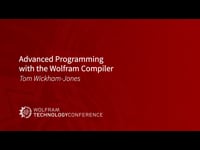 |
Tom Wickham-Jones The Wolfram Compiler converts Wolfram Language into native machine code and provides a faster execution path as well as many opportunities for innovative programming features. This talk covers advanced programming with the Wolfram Compiler, focusing on performance computing and showing the latest features that work ... |
 |
Anshu Manik Wolfram Technical Consulting works with users to leverage Wolfram technologies to automate processes, design and train new machine learning/AI models, develop custom applications, implement innovative algorithms, run deep data ... |
 |
Oliver Reubenkoenig This talk demonstrates techniques for setting boundary constraints and boundary loads common in solid mechanics and how they map to Wolfram Language, providing capabilities to build and analyze real-world solid ... |
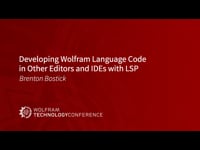 |
Brenton Bostick The notebook front end is a great tool for developing Wolfram Language, but there are other editors and IDEs available. This talk shows new integration with Sublime Text and Visual ... |
 |
Charles Pooh |
 |
Suba Thomas and Sergio Vargas Wolfram Language has been enhanced to better integrate system modeling and automate and streamline subsequent controller design and simulation. This talk presents these developments along with System Modeler application examples ... |
 |
Anton Antonov This presentation discusses designing a conversational agent for data acquisition workflows, an extension of the work on multilanguage data wrangling conversational agents from WTC-2020, including the various facets and subparts. |
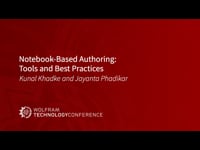 |
Kunal Khadke and Jayanta Phadikar This presentation addresses best practices when creating Wolfram Language notebook-based publications based on processes learned while creating courses for Wolfram U, customer consulting projects and studies of previous notebook-based publications. |
 |
Matteo Fasano and Ankit Naik Wolfram Virtual Labs are open educational resources in the form of interactive course-ware that are used to explain different concepts in the classroom. Presenters demonstrate real-world uses of Virtual Labs ... |
 |
James Boyd This presentation examines possible correspondence between computational complexity classes in computational graphs and higher homotopy classes between computability paths via the application of two methods: category theory and Homotopy Type ... |
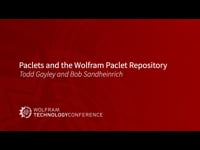 |
Todd Gayley and Bob Sandheinrich The Wolfram Paclet Repository is here! See a preview of the upcoming new system for publishing and distributing paclets to Wolfram Language users everywhere. Learn what paclets are and how ... |
 |
Bruno Autin What is an elementary particle? After a brief historical introduction, the approach followed by Richard Feynman is explained using three experiments derived from Young's test of diffraction by two slits. The statistical approach is supported by functions and transformations available in the Wolfram Language. ... |
 |
Ankit Naik In this presentation, we will explore the Modelica Fluid library. This library provides components for one-dimensional thermo-fluid flow in networks of vessels, pipes, fluid machines, valves and fittings. For this ... |
 |
Jordan Hasler and Jason Sonnenberg, PhD This talk demonstrates various ways Wolfram|Alpha Notebook Edition can be used in introductory mathematics and chemistry courses to encourage concept exploration and visualization. New features are highlighted using standalone ... |
 |
Lou D'Andria Contextual interfaces in Wolfram Notebooks continue to enable new and interesting approaches to interface design. In this talk, we will review the rudiments of attached cells, examine existing uses of ... |
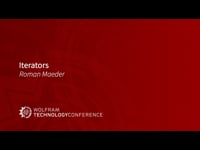 |
Roman Maeder Iterators are a generalization of lists that are accessed one element at a time. Iterators allow us to work with data whose length is infinite or unknown, and they avoid the explicit generation of all elements at the same time by using incremental generators. We show an implementation of iterators that allows us to use them like lists, with natural Wolfram Language syntax. Along ... |
 |
Gosia Konwerska, PhD, and Eduardo Serna Spatial datasets consisting of a set of measured values at specific locations are becoming increasingly important. Examples include temperature, elevation, concentration of minerals, etc. We will preview upcoming Wolfram Language ... |
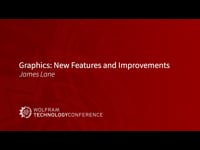 |
James Lane New Graphics features in Version 13 include MaterialShading, a new Light directive and the canonicalization of AxisObject. Graphics has significant improvements to software rasterization, Dashing, VertexTextureCoordinate specification and the ability to ... |
 |
Bernat Espigule This talk discusses New Learning Journeys, created exclusively for the History of Mathematics Project. Virtual exhibits and their navigation were entirely built using Wolfram Language, the Wolfram Knowledgebase and Wolfram ... |